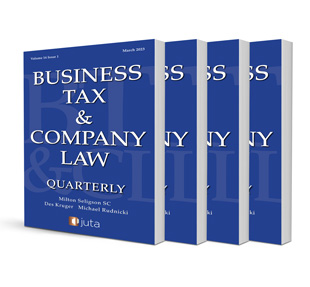
Unlocking the Beneficial Interest and Beneficial Ownership Quagmire
Author: Julie Oppenheim
ISSN: 2219-1585
Affiliations: Partner, M&A, Bowmans
Source: Business Tax & Company Law Quarterly, Volume 14 Issue 2, 2023, p. 13 – 18
Abstract
The General Laws (Anti-Money Laundering and Combating Terrorism Financing) Amendment Act 22 of 2022 (GLAA) was introduced in 2022 and amends the Companies Act 71 of 2008 (Companies Act) by (i) providing for a comprehensive mechanism through which the Companies and Intellectual Property Commission can keep accurate and up-to-date beneficial ownership information; (ii) requiring a company, which is not an ‘affected company’ for purposes of the Companies Act, to keep, and fi le with CIPC, a record of the ’beneficial owners’ of a company, and by providing for specified timelines within which a company must record any changes in this information; (iii) requiring a company, which is an ‘affected company’ for purposes of the Companies Act, to establish and maintain a register of the persons who hold beneficial interests equal to or in excess of 5% of the total number of securities of that class issued by the company, together with the extent of those beneficial interests; and (iv) specifying that persons who are convicted of offences relating to money laundering, terrorist financing, or proliferation financing activities or are subject to a resolution of the UN Security Council are prohibited from registering as company directors. Key to the amendments is the distinction between a company which falls within the definition of an ’affected company‘ for purposes of the Companies Act, on the one hand, and a company which does not fall within the definition of an ;affected company; for purposes of the Companies Act, on the other hand. Also key is the definition of ‘beneficial owner’ and the manner in which it will be interpreted — which remains to be seen. Time will tell as to how beneficial these provisions are and whether they can assist in having South Africa removed as a grey list country. Enforcement may be more effective if the sanction for non-compliance is a criminal sanction (in addition to a financial sanction) — as is the case in Mauritius, which managed to convince the Financial Action Task Force to remove it from the grey list.